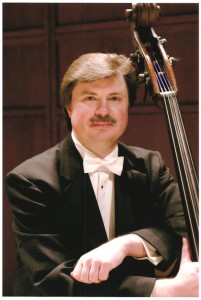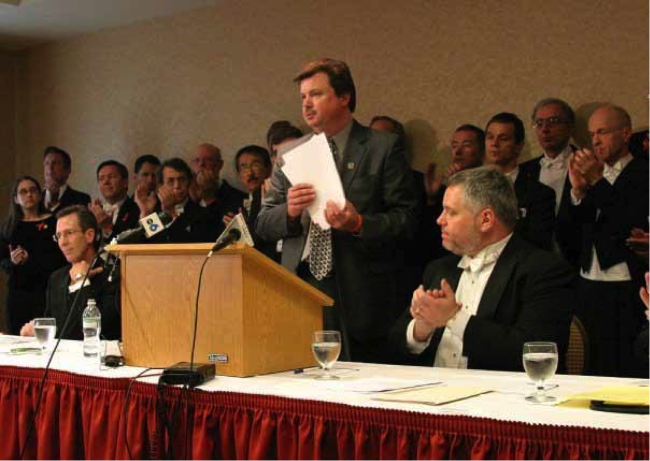
Photo credit: Michael Zirkle
The North Carolina Symphony recently performed an unusual concert, the brainchild of our music director, Grant Llewellyn. Maestro Llewellyn wanted our audiences to experience some of the musicians’ other unique talents, besides the ones they are known for week in and week out. My talented colleagues were given the chance to perform in activities as disparate as flamenco dancing and bluegrass jamming. Our audiences loved every second.
As I enjoyed the concerts from the bass section, I was especially impressed by the bluegrass band that had been assembled. They were fantastic, and over four nights they truly brought down the house.
That band, known humorously as “Jackie and the Back-stage Boys” (a nod to one of our orchestra’s young stars, Jackie Saed-Wolborsky, and to the members of the stage crew who joined in on mandolin and guitar), was composed of members of the NCS with tenures ranging from over 35 years to less than 8 months. As great as they were musically, I think I enjoyed the diversity in tenures as much as anything. Musicians who had been in the orchestra since before some of the others were born were performing together perfectly and with a camaraderie that demonstrated that this orchestra is truly a family. The embrace of our loyal audiences served to confirm even more the strength of the community that surrounds this orchestra.
In this issue of Senza Sordino, ICSOM Secretary Laura Ross has compiled several stories of amazing musicians who have served their orchestras for over fifty years. I encourage you to read through the stories of these remarkable people, and I guarantee you will be inspired. I often consider how rare it is in today’s world to find true loyalty. But throughout ICSOM, we have musicians who have dedicated their entire lives to their orchestra, and to serving their community and educating its children.
Every orchestra has a unique sound, a product of the individuals who have developed that sound over time. It is a mix of the young and the more experienced. I find myself reinvigorated by that relationship, both in my own orchestra and as I observe it in others.
Our orchestras and indeed our communities are enriched by our diversity. I have seen how the newer members seek to learn from the history of the orchestra, and how we all can be invigorated by youth.
Every person is in a period of transition every day of their lives. When I joined the North Carolina Symphony, I was the youngest member at the time. I have now lost that distinction—by several decades no less. How can it be true?
Occasionally, we will hear managers talking about “generational shift.” That would be fine if they were speaking of the natural process of time, but we know they aren’t. There are some managers, including several who have actually said it to my face, who fail to appreciate how our orchestras are strengthened by the diversity of experience on stage. Fortunately, the federal government does appreciate it, as demonstrated through the enactment of the Age Discrimination in Employment Act of 1967.
My friends in my orchestra have served this state through changing times and decades, and long before we had a world-class concert hall in Raleigh. My longer tenured colleagues were pioneers, bringing music to schoolchildren throughout the state on old buses and rural back roads. While the accommodations and the highways have improved immeasurably, education remains a critical part of our mission. The trailblazers that arrived before me created an identity for this orchestra, and they brought the AFM to its members, fighting tirelessly for many years to achieve pensions, health care, and many other benefits that are today simply expected.
The same is true for orchestras throughout ICSOM, as you’ll read in the life stories in this issue. These brief biographies consistently tell the story of hard-fought battles and victories slowly won amidst an atmosphere of incredible loyalty and ongoing artistic accomplishment.
As I watched my colleagues perform together and observed the sense of ownership our audiences feel, I couldn’t help but think of the musicians of the Columbus Symphony (CSO). Indeed, they’ve not been far from my mind at any moment during these past few months. I was impressed with Barbara Zuck’s May 11 review of the CSO in the Columbus Dispatch in which she points out that the popularity of the orchestra is rising at the very moment that the board threatens to destroy the community’s investment in that orchestral family.

Columbus Symphony musicians at a press conference on May 20. At the press conference, Dan LaMacchia (seated at left) presented independent research backing musician positions in their current struggles. Also in the front are ICSOM Chairperson Bruce Ridge (standing) and Local 103 President Douglas Fisher (seated at right).
Photo credit: David Tanner
I couldn’t help but contrast two recent editorials, one from Raleigh’s News & Observer, and the other from the Columbus Dispatch. Here in North Carolina we are fortunate to have a great newspaper that seeks to serve its state, and they support the musicians at every turn. Throughout this recent crisis in Columbus, the citizens have not been able to rely on the Columbus Dispatch to serve their community in the same way.
In response to a new outreach program the NCS has initiated, the editorial staff of the News & Observer wrote:
Ever since its formation in 1932, the N.C. Symphony has belonged to the people. . . . Here is an appropriate gesture of solidarity from this grand group of musicians to the citizens who have long supported the orchestra. . . . OK, OK. We know this isn’t a miracle-working tour. Or is it?
Compare that to the words of the editorial staff of the Columbus Dispatch, just a few days later, when speaking of the musicians of the CSO:
The Columbus Symphony Orchestra is at a crossroads that will determine whether it continues or folds. The outcome is in the hands of the musicians union. . . . The union disingenuously accuses the board of being derelict in its duty to seek out more donations . . . . The musicians should stop focusing on blame and start dealing with the facts.
Can there be any doubt that the citizens of central Ohio deserve better from their hometown newspaper?
The musicians of the Columbus Symphony bring great credit to their city. Sadly, I must join with the many other voices who have reluctantly noticed that the Columbus Dispatch has added nothing but negativity to the debate and has offered its readership not even an illusion of fair and balanced reporting.
For me, I imagine that I am now past the midway point of my career. I remember the beginning, with the Virginia Symphony Orchestra, as if I could still somehow touch it. I remember the scent of backstage—I could name every musician on stage with me that night in February of 1979. We played Brahms’ First Symphony in Norfolk’s Chrysler Hall. After the show I had a barbeque sandwich and a limeade at Doumars’ drive-in and wondered what the future would bring. Little did I know…
To my more tenured colleagues across the nation, I urge you to be invigorated by our newest members, and to help them understand the battles that you have fought. To our newest members, I urge you to be inspired by your colleagues, and to realize that it will seem like a very brief time before you also find yourself standing at your midway point. And to any manager who speaks of any need for a “generational shift” in their orchestra, I urge them to think about music (and life) in a richer way.





